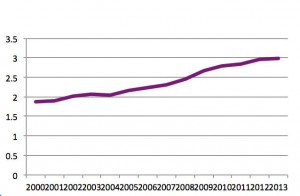The release of ONS figures on the consumption of physical materials in the UK got some attention earlier this week. The statistics show that in both total and per capita terms, there has been a long term decline in the amount of stuff involved in economic activity, although it’s still just over 10 tonnes per person each year (down from 15 tonnes in 2000). The new figures take account of trade and the fact that the UK is a net importer, particularly of manufactures – figures for earlier years, which also suggested a decline in the ‘weight’ of the UK economy, did not adjust for trade. The ‘resource productivity’ of the economy is increasing so we now get nearly £3 worth of GDP for every kilo of materials, up from £1.87 in 2000. The one resource whose use is not trending down is fossil fuels.
What’s the explanation? The same ones as 20 years ago when I wrote (free pdf) The Weightless World: the switch toward services and intangibles, the miniaturisation and use of lighter materials in products such as fridges and cars, the combining of many products (phone, camera, tape recorder, map etc) into one (smartphone), the dematerialisation of goods and services (books to e-books, CDs to downloads). Much more recycling, too.
[amazon_image id=”0262531666″ link=”true” target=”_blank” size=”medium” ]Weightless World: Strategies for Managing the Digital Economy (Obex Series)[/amazon_image]
Isn’t this good news? Tim Jackson (of [amazon_link id=”1849713235″ target=”_blank” ]Prosperity Without Growth[/amazon_link] fame) comments grumpily in this Guardian article that he doesn’t believe the figures: “You do see these micro trends of peak stuff, but the idea we’re living in a peak stuff world is nuts.” Not for a moment am I relaxed about the environmental impact of economic growth (and I just joined the Natural Capital Committee because of my belief that we need to do much better at stewardship of our natural assets – see Dieter Helm’s [amazon_link id=”0300210981″ target=”_blank” ]Natural Capital: Valuing the Planet[/amazon_link]). Yet I am, you know, pretty happy that this trend is repeated across the OECD and that the UK is doing particularly well in terms of reduced material consumption.
There has been much comment about the UK’s dismal labour productivity and multifactor productivity performance of late. There is probably some mismeasurement, but not enough to explain the flatlining. We ought though to recognize the improved productivity of some physical (buildings, sharing of assets) capital. And this trend in resource productivity, £ of GDP per kilo of materials used in creating it, is welcome:

Real output per kilo of material used, UK 2000-2013

Pingback: Great transformations
Have you seen Anne Owen’s Conversation article on this? ->
https://theconversation.com/have-we-hit-peak-stuff-55728
Her team took a slightly different / more disaggregated approach to import make-up and found a rather less clear picture.
Thanks for the link – I hadn’t read it.